When Ivan Hastings’ grandfather John moved to Roscrea, Co Tipperary, from Abbeyleix, Co Laois, in 1915, he made the entire journey by bicycle. He couldn’t have known, then, that he would spend the rest of his life in Roscrea – a town already steeped in rich history – marry, and build a business that would span generations.
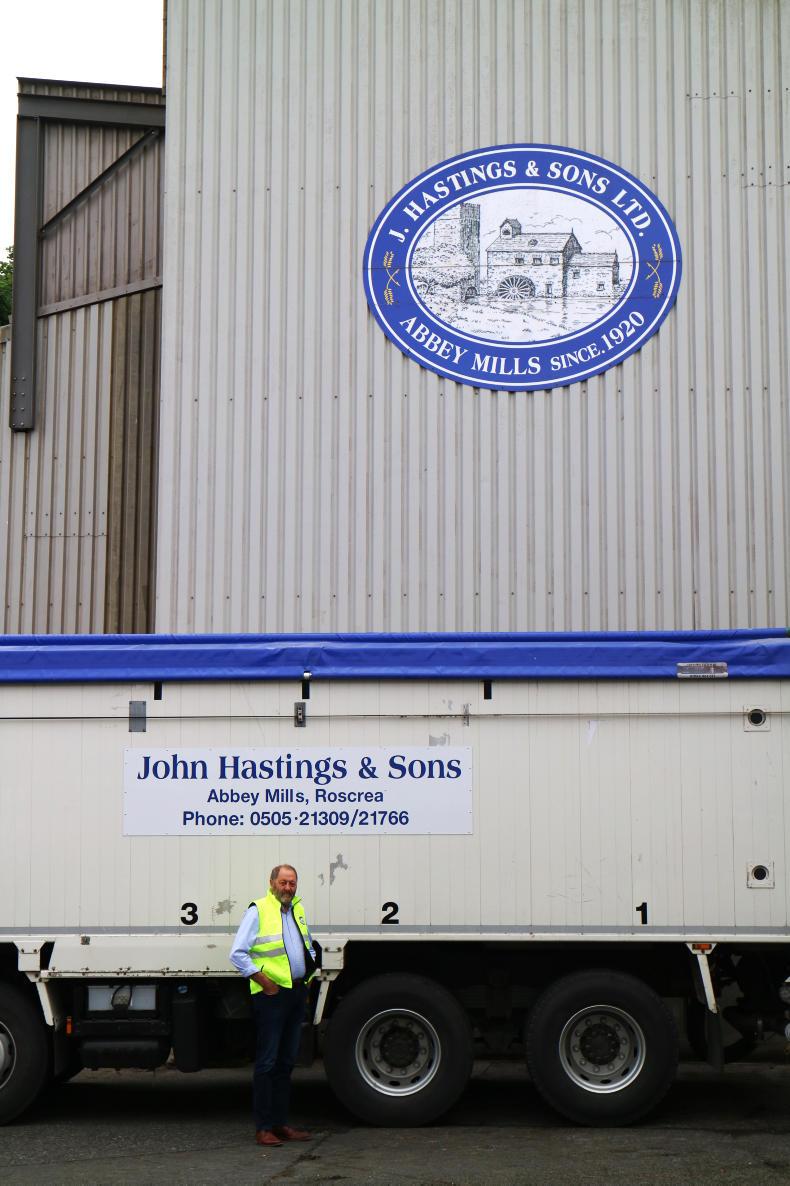
In 1920, he purchased what is now Hastings Mill (previously run by the Rudd family) and this month the mill is celebrating its 100th birthday. Ivan, with the support of his dedicated staff, wife Lynda and his mother, Bertha, operate the animal feed business with a few modern twists but maintain his father and grandfather’s dedication to their clients; the local farming community.
“My grandfather actually started off in Roscrea working in a grocery shop, but then he became an auctioneer,” Ivan says. “The chance came in 1920 to purchase the present mill down in Abbey Street – it was originally a water wheel mill. I would say the mill dates back into the mid-1800s.”
Family history
John married Ivan’s grandmother, Charlotte, and they had five children, including Ivan’s father, Jim. In those earlier years, the mill would have ground grain (mainly oats) brought in by the farmers themselves.
“It was a slow process,” Ivan says. “The farmers would bring their grain in the morning and then do their shopping. They would then collect their ground meal on the way home.”
Ivan’s father was born in 1925. The youngest in the family; he would eventually play a major role in modernising the business.
“He was willing to run the mill, even though it was a bit of a hardship, at the time,” Ivan explains. “There were no forklifts and the only way to handle the bags of grain was to carry them. Nowadays, the maximum weight you’d be allowed to carry is 25kg, but in those days the bags were at least four, if not five times that weight. They had to be carried up ladders or with a chain hoist to the very top of the mill.”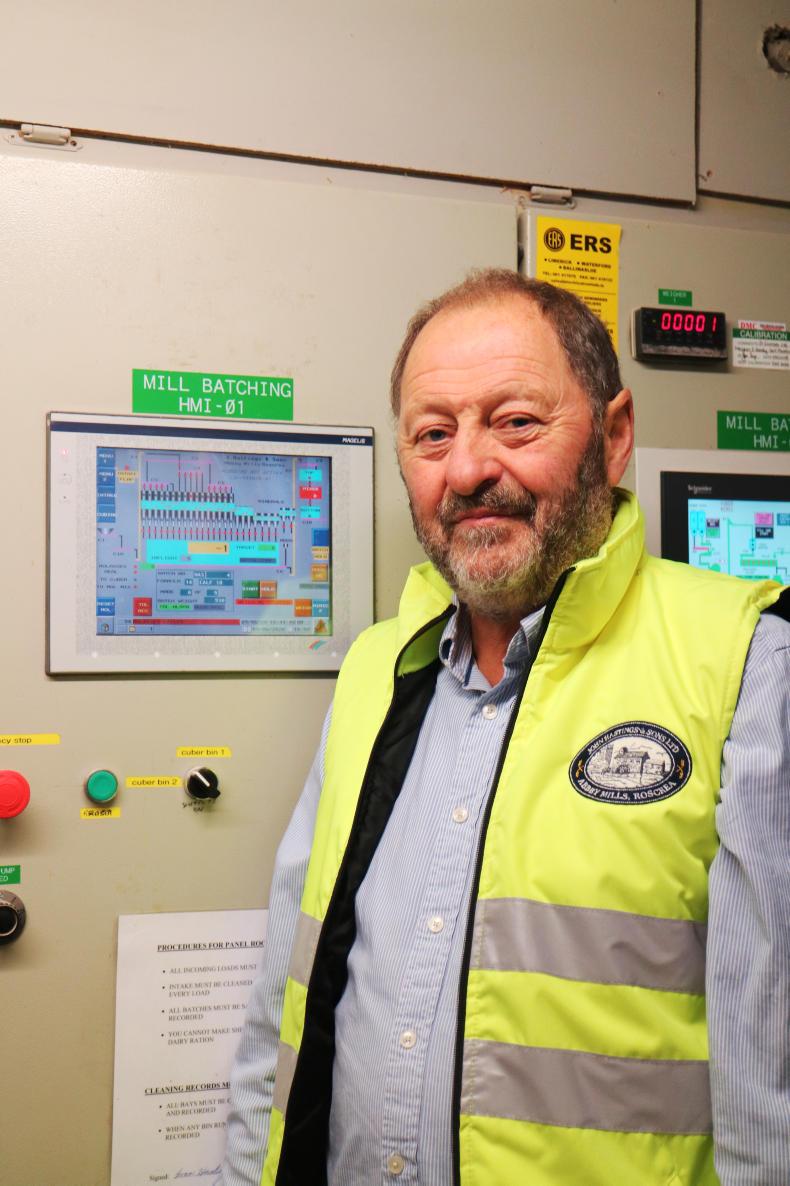
By the early 1950s, although Roscrea had electricity, the mill was still running on its water wheel. The business was open six days a week and late on Saturdays. Farmers would often call late into the mill for feed after dropping their list of messages to the shops and having a drink or two in the local pubs.
“We’re trying to not offer that service now,” Lynda laughs.
The dark evening work was difficult. They would have to bring in electricity to run the mill’s motors, but Ivan’s grandfather was reluctant to make the change. According to Ivan, this prompted his father to “go on strike” to Dublin for a few days in an effort to convince him otherwise. He did finally agree, and this made a massive difference to the business.
“The mill wheel wouldn’t have been as efficient,” Ivan explains. “Electricity enabled us to start making pig meal, which, in the late 1950s was taking off. Nearly every house in town kept a few pigs out the back of their house.”
In the late 1950s, Ivan’s mother, Bertha, came on board to help run the business alongside her husband. Though she has been cocooning throughout the COVID-19 pandemic, through Lynda and Ivan she recalls how different things were for their business in those days; saying they would then charge 2½d (2.5 old pence; 1.27c today) per stone (6.35kg) for rolling grain, or 0.2c/kg.
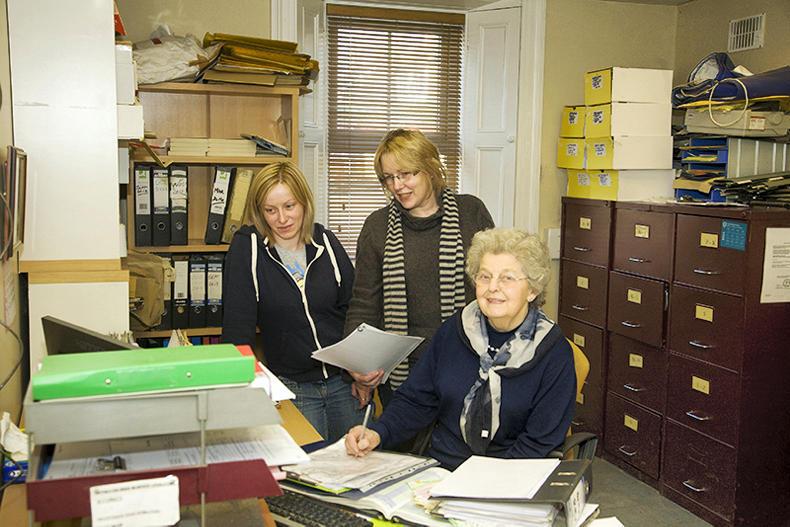
Long-time Hastings Mill employees Anne and Maria with Ivan Hastings’ mother, Bertha, who at 87 is still centrally involved in the family business.
“Together, my parents really brought the business to where it is,” Ivan says. “My mother is 87 years old – apart from the COVID-19, she would have been down to the mill six days a week. She’s very popular with the customers. She remembers a lot of fathers and grandfathers coming in when she sees our present customers.”
Customer care
The multi-generational aspects of both the business and the clientele are what set Hastings Mill apart from larger feed companies, and Ivan feels that the personal care taken with each customer is of utmost importance.
“We feel very lucky to have the loyalty from our local farmers,” he says. “We don’t spread our wings too far and try to give our best customer service.”
Ivan’s father remained active in the business until his passing in 2005. Ivan says, as with many farmers, retirement was never an option for him.
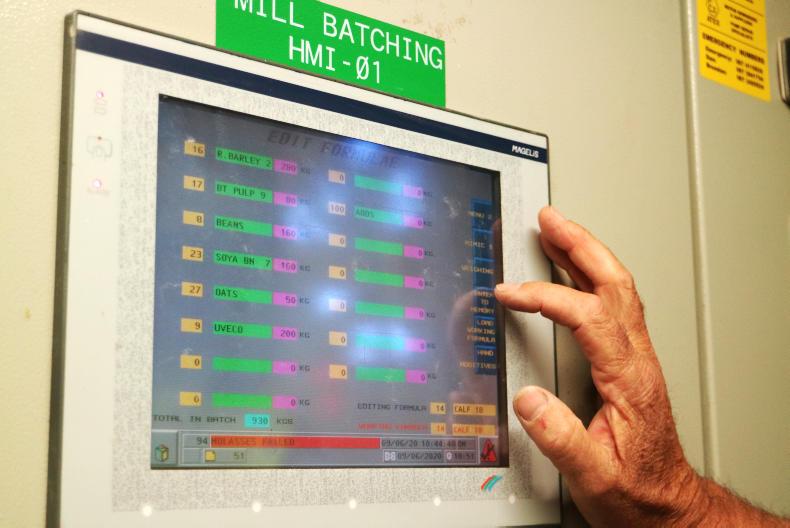
“The work was his life,” he says. “I joined the business when I came back from school in 1977 and he was very easy to work with. I’m lucky I had such a good tutor.”
Today, Hastings Mill continues to process feed for beef, dairy, sheep and goats. Their customer service hasn’t changed much over the years, but their business has grown in positive ways; becoming certified with Bord Bia and putting in necessary traceability protocol. Ivan feels the quality of their animal feed has never been higher.
“We have to be able to trace every bag of meal; who bought it, what ingredients went into it – it’s all very detailed. It’s important for consumers to understand what they’re buying – it comes through in the quality of the finished product.”
Irish Country Living asks Ivan what he thinks the next 100 years holds for Hastings Mill.
“I’m happy if we keep the customers that we have,” he says. “If we expand too much, we risk losing that personal touch and quality control. We have a great, loyal staff – some are here 30 years and some even over 40. They know the business so well and they’ve grown with us as we developed.”
To celebrate 100 years in business, Hastings Mill will commence a series of twice weekly draws for the next month starting on their anniversary date, the 20 June. They are also making a donation to Embrace FARM; the national charity for farm accident awareness.
“Farm accidents are a huge problem,” Ivan says. “We want to lend our support to that worthy cause.”
When Ivan Hastings’ grandfather John moved to Roscrea, Co Tipperary, from Abbeyleix, Co Laois, in 1915, he made the entire journey by bicycle. He couldn’t have known, then, that he would spend the rest of his life in Roscrea – a town already steeped in rich history – marry, and build a business that would span generations.

In 1920, he purchased what is now Hastings Mill (previously run by the Rudd family) and this month the mill is celebrating its 100th birthday. Ivan, with the support of his dedicated staff, wife Lynda and his mother, Bertha, operate the animal feed business with a few modern twists but maintain his father and grandfather’s dedication to their clients; the local farming community.
“My grandfather actually started off in Roscrea working in a grocery shop, but then he became an auctioneer,” Ivan says. “The chance came in 1920 to purchase the present mill down in Abbey Street – it was originally a water wheel mill. I would say the mill dates back into the mid-1800s.”
Family history
John married Ivan’s grandmother, Charlotte, and they had five children, including Ivan’s father, Jim. In those earlier years, the mill would have ground grain (mainly oats) brought in by the farmers themselves.
“It was a slow process,” Ivan says. “The farmers would bring their grain in the morning and then do their shopping. They would then collect their ground meal on the way home.”
Ivan’s father was born in 1925. The youngest in the family; he would eventually play a major role in modernising the business.
“He was willing to run the mill, even though it was a bit of a hardship, at the time,” Ivan explains. “There were no forklifts and the only way to handle the bags of grain was to carry them. Nowadays, the maximum weight you’d be allowed to carry is 25kg, but in those days the bags were at least four, if not five times that weight. They had to be carried up ladders or with a chain hoist to the very top of the mill.”
By the early 1950s, although Roscrea had electricity, the mill was still running on its water wheel. The business was open six days a week and late on Saturdays. Farmers would often call late into the mill for feed after dropping their list of messages to the shops and having a drink or two in the local pubs.
“We’re trying to not offer that service now,” Lynda laughs.
The dark evening work was difficult. They would have to bring in electricity to run the mill’s motors, but Ivan’s grandfather was reluctant to make the change. According to Ivan, this prompted his father to “go on strike” to Dublin for a few days in an effort to convince him otherwise. He did finally agree, and this made a massive difference to the business.
“The mill wheel wouldn’t have been as efficient,” Ivan explains. “Electricity enabled us to start making pig meal, which, in the late 1950s was taking off. Nearly every house in town kept a few pigs out the back of their house.”
In the late 1950s, Ivan’s mother, Bertha, came on board to help run the business alongside her husband. Though she has been cocooning throughout the COVID-19 pandemic, through Lynda and Ivan she recalls how different things were for their business in those days; saying they would then charge 2½d (2.5 old pence; 1.27c today) per stone (6.35kg) for rolling grain, or 0.2c/kg.

Long-time Hastings Mill employees Anne and Maria with Ivan Hastings’ mother, Bertha, who at 87 is still centrally involved in the family business.
“Together, my parents really brought the business to where it is,” Ivan says. “My mother is 87 years old – apart from the COVID-19, she would have been down to the mill six days a week. She’s very popular with the customers. She remembers a lot of fathers and grandfathers coming in when she sees our present customers.”
Customer care
The multi-generational aspects of both the business and the clientele are what set Hastings Mill apart from larger feed companies, and Ivan feels that the personal care taken with each customer is of utmost importance.
“We feel very lucky to have the loyalty from our local farmers,” he says. “We don’t spread our wings too far and try to give our best customer service.”
Ivan’s father remained active in the business until his passing in 2005. Ivan says, as with many farmers, retirement was never an option for him.

“The work was his life,” he says. “I joined the business when I came back from school in 1977 and he was very easy to work with. I’m lucky I had such a good tutor.”
Today, Hastings Mill continues to process feed for beef, dairy, sheep and goats. Their customer service hasn’t changed much over the years, but their business has grown in positive ways; becoming certified with Bord Bia and putting in necessary traceability protocol. Ivan feels the quality of their animal feed has never been higher.
“We have to be able to trace every bag of meal; who bought it, what ingredients went into it – it’s all very detailed. It’s important for consumers to understand what they’re buying – it comes through in the quality of the finished product.”
Irish Country Living asks Ivan what he thinks the next 100 years holds for Hastings Mill.
“I’m happy if we keep the customers that we have,” he says. “If we expand too much, we risk losing that personal touch and quality control. We have a great, loyal staff – some are here 30 years and some even over 40. They know the business so well and they’ve grown with us as we developed.”
To celebrate 100 years in business, Hastings Mill will commence a series of twice weekly draws for the next month starting on their anniversary date, the 20 June. They are also making a donation to Embrace FARM; the national charity for farm accident awareness.
“Farm accidents are a huge problem,” Ivan says. “We want to lend our support to that worthy cause.”








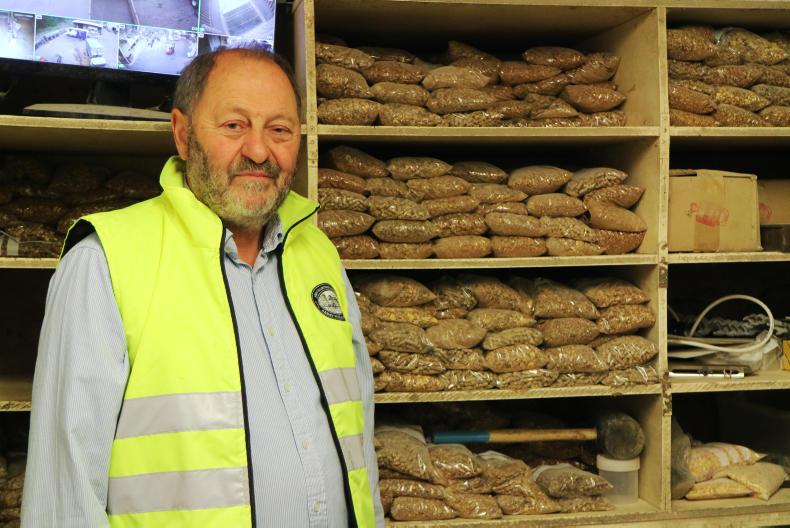
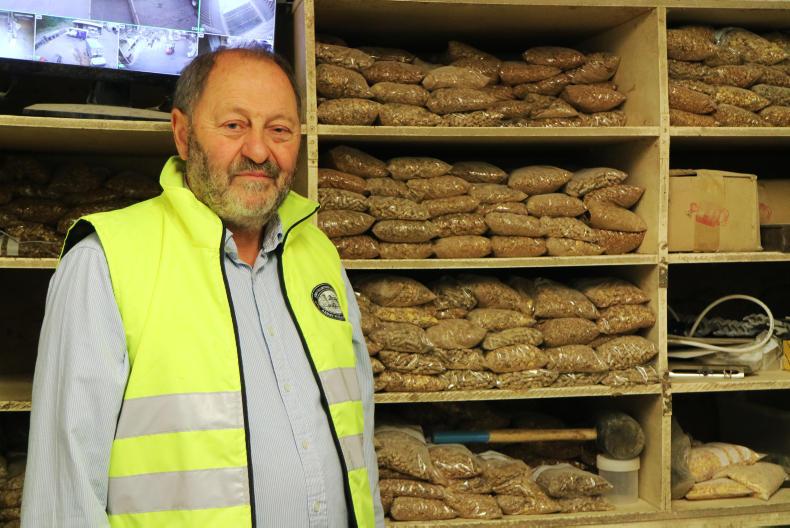




SHARING OPTIONS